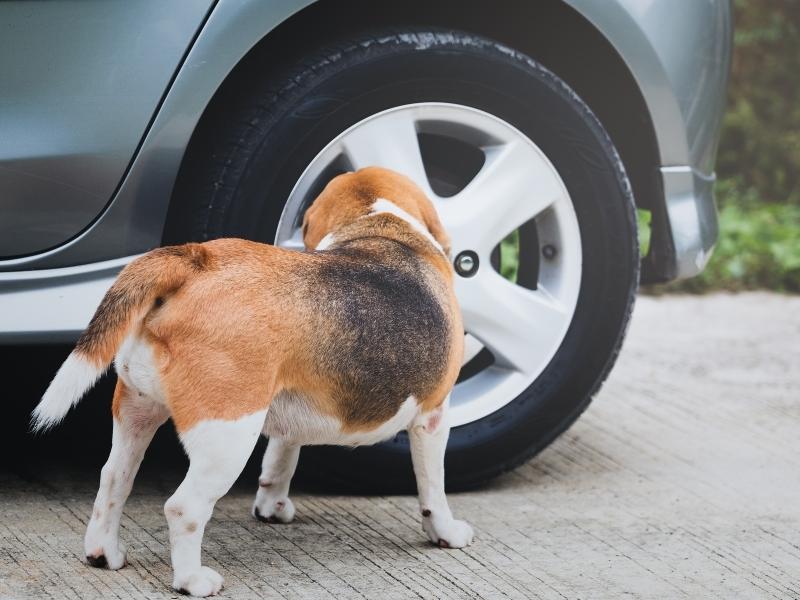Do you have long working hours or an inconsistent schedule? If so, there’s a chance you’ve come home to discover your dog had an “accident” while you were gone.
So, how long can dogs hold their pee? Veterinarians recommend letting an adult dog pee every six to eight hours. However, some dogs can hold their pee for 10 to 12 hours. Puppies and senior dogs don’t have good bladder control and can hold their pee for three to four hours, depending on age, size, and diet.
While some dogs are comfortable holding their pee for eight hours, others feel more comfortable going to pee more often. How long dogs can hold their pee depends on many factors, which we’ll cover in this article.
Factors That May Affect How Long a Dog Holds It Pee
Truth be told, there are no set rules dogs must follow when it comes to holding their pee. All dogs are individuals, and some canines can hold their urine longer than others.
Most dogs can typically hold their pee for several hours, but it’s essential to know how long is too long.
How long your dog holds its pee depends on several factors, including, size, age, health, training, diet, environment, and others.
Health
Specific health problems like diabetes, kidney disease, or urinary tract infections can make your dog pee more often. Some medications, including certain types of heart pills, can cause frequent urination.
If your dog starts to pee more often than before, look for any other unusual symptoms that can point to a health problem. Does your dog strain to pee, and are there any signs of pain or discomfort? Are there any changes in the smell or the color of dog urine?
If anything seems amiss, take your dog to the veterinarian immediately to rule out serious health problems.
Age
Age is one of the most important factors affecting a dog’s ability to hold it or not to hold it.
As you probably know, puppies and senior dogs don’t have good control over their bladders and need to pee more often.
Puppies who aren’t fully potty trained can’t hold their bladders as long as adult dogs. In some way, this is because puppies have underdeveloped and small bladders and urinary systems.
The muscle that contracts to hold and release the dog’s bladder needs time to develop properly. This, combined with decreased holding capacity, means that puppies need frequent potty breaks.
Based on age, here’s an estimate on how long puppies can hold their pee:
- Two-month-old puppies can hold their pee for one to two hours. Very young puppies can’t hold it more than one hour and need to be taken out frequently
- A three-month-old puppy can hold its pee for three to four hours
- Four to six months old puppies need to urinate every four to six hours
- Puppies older than six months can hold their urine between six and eight hours
As a general rule, you can expect your puppy to hold its pee for approximately one hour for every month it’s old, up until the age of eight months.
Expect an adult dog to hold its pee for six to eight hours. Some dogs may be able to hold their urine for 10 to 12 hours. But you should never make your dog hold its pee more than necessary.
A dog’s ability to control its bladder declines with age. Most senior dogs between the ages of seven and 11 can hold their bladders for four to six hours. By the time dogs become 12 years old, their bladder muscles weaken even further, making them hold their pee for two to four hours.
Diet
The amount and type of food your dog consumes will also affect how long it can hold its pee.
Eating canned dog food, cooked food, or raw diets can lead to more frequent urination. On the other hand, eating dry kibble can make your dog pee less.
However, keeping your dog hydrated is more important than fewer pee breaks. The extra moisture in the diet can help keep your dog hydrated and promote good digestion. Make sure your dog has access to fresh and clean water to prevent dehydration.
Size
Size is another factor that affects how long dogs hold their pee.
Generally speaking, smaller dogs need more frequent pee breaks than larger dogs. While it’s difficult to estimate how much urine a dog’s bladder will hold, larger dog breeds have larger bladders than small dogs.
However, no matter how big or small your dog is, it will still need regular bathroom breaks. Veterinarians recommend that a dog has at least three to four potty breaks a day, regardless of its size.
Dangers of Letting Your Dog Hold Its Pee

Some adult dogs can hold their pee for 10 to 12 hours if they have to, but asking your dog to do that regularly can hurt its health. Making your dog hold its pee for longer than necessary can lead to:
UTI
A dog’s urinary tract system flushes bacteria and toxins from the kidneys, urethra, and bladder. Holding the urine longer than necessary gives bacteria and toxins a chance to multiply in the urinary tract.
This can lead to urinary tract disease and crystal or stone formations which lead to blockages. If left untreated urinary blockages can be deadly.
Incontinence
Incontinence is commonly seen in elderly dogs, but it can be diagnosed in dogs of any age. When a dog is regularly forced to hold its pee, the distension of the bladder causes damage to the surrounding muscles and tissues, leading to urinary incontinence.
Please note incontinence is irreversible. But you can prevent it by taking your dog to regular bathroom breaks.
Bladder Cancer
Bladder cancer isn’t commonly diagnosed in dogs that hold their urine for too long, but it’s possible. The longer the dog holds its pee, the longer the carcinogens from urine are in contact with the bladder and the urinary tract.
Importance of Bathroom Schedule for Dogs
Creating a bathroom routine for your dog will help it avoid discomfort and anxiety. Holding urine for long periods is uncomfortable and stressful for your dog.
Having a set potty routine will eliminate “accidents” inside the house. So, you won’t have to spend hours scrubbing carpets and looking for ways to get rid of dog urine smell from your home.
Most importantly, having a bathroom schedule is beneficial for your dog’s health as it lowers the risk of reoccurring urinary tract infections and incontinence.
What Happens if a Dog Holds His Pee Too Long?
It’s unhealthy for dogs to hold their pee for too long. If a dog holds its pee for more than 12 hours, there’s a risk of bladder distention.
A dog’s bladder is created to extend to some extent before pushing the urine out. But, when a dog is holding its pee, the bladder will continue to fill until it ruptures.
Unless there’s a blockage or another health problem, most dogs will pee before their bladder ruptures.
Holding urine for too long can also weaken bladder muscles, cause toxins to build up, or lead to calcification and crystallization formations in the urine tract.
Calcified and crystalized stones are painful to pass. They also cause physical damage, severe pain, and are potentially life-threatening.
Forcing your dog to hold its pee for too long is inhumane and painful, and it can cause many health problems. It’s better to just let your dog pee regularly.
How Long Should Dogs Hold Their Pee Overnight?
Adult dogs can hold their pee for eight to 10 hours overnight while sleeping. Puppies, in general, can hold it all night by the time they are five months old.
To ensure that your dog isn’t struggling to hold it all night, take it for a walk in the evening before bedtime. Also, don’t wait too long to walk your dog in the morning. It’s best to give your pup a chance to pee as soon as possible.
Conclusion
How long a dog can hold its pee depends on several factors, including age, size, health, diet, and training. Most adult dogs can hold their urine for six to eight hours, though some may hold it for 10 to 12 hours.
But just because a dog can hold it doesn’t mean it should! Forcing a dog to hold its urine for too long is cruel and unhealthy and puts it at risk of bladder rupture. To keep your dog healthy, stick to a regular bathroom schedule and allow your dog to go potty at least three or four times a day.
Related Articles:


0 Comments